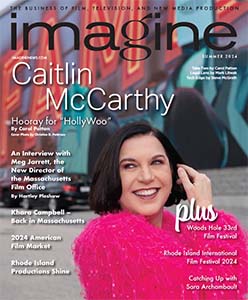 Now what? We’ve written a terrific script. Everybody likes it, except for all the people who don’t, but that’s typical. We went to a screening last night at the Directors Guild here in LA; I’m a member. The movie was WHITEY; guess what it’s about. It had great shots of Boston, sexy helicopter approaches to the federal courthouse and driving shots through Southie and the people, the natural-born characters with accents somebody from Kansas might need subtitles for and enough to make a guy homesick. Great job, I thought. Documentary filmmaking at its most provocative.
Now what? We’ve written a terrific script. Everybody likes it, except for all the people who don’t, but that’s typical. We went to a screening last night at the Directors Guild here in LA; I’m a member. The movie was WHITEY; guess what it’s about. It had great shots of Boston, sexy helicopter approaches to the federal courthouse and driving shots through Southie and the people, the natural-born characters with accents somebody from Kansas might need subtitles for and enough to make a guy homesick. Great job, I thought. Documentary filmmaking at its most provocative.
But then later at the urinal I hear all kinds of dissent from the piss and moaners and that’s typical, too. I wanted to stop every expert midstream and say, WTF, is it because it wasn’t YOUR movie getting a big-time screening at the DGA, Q&A to follow, or could you really have done it better or you don’t like Boston or what? Cuz I know people who know people.
And then I remembered that it doesn’t really matter, does it? We all have to go about our business, take the situation in hand, eyes on the prize, but I digress. I’m sure it’s altogether different in the women’s room; women directors and screenwriters – I’ve been to a few WGA screenings this trip, too – couldn’t be anywhere near as bitchy as men; isn’t that right?
What’s right is that this script, BEAUTIFUL WOMEN, is OUR script, sprung from a heartfelt and brilliant idea; we to our own selves stayed true, to misquote Polonius, and, through a panorama of miscues, mistakes and rewrites, created this mini-masterpiece. We’ve taste-tested it; we’ve asked the penetrating questions and ended up right where we wanted to come. More digression; innuendo drops from the tongue with a title like ours. But, listen, that’ll give the guys in the pissoir something to talk about. What I want to talk about is what do we do now?
When I started in this business the answer would have been “not much.” A writer wrote a script and hoped for the best. Even if he’d been paid in advance – and I’ve been paid for a slew of them – there were no guarantees that the movie would be made. Come from a New England work ethic like mine, where a man does a day’s labor and steps back to enjoy the fruits of it, you’ll find it odd to be told, sorry, we’re not moving ahead with the project; been there. Or, we’re moving ahead but you’re not; been there, too. But that was then and now is now and now we have options.
Peruse the pages of this magazine or hit any of the many festivals dotting the pastoral landscape from Maine to Rhode Island and you’ll find nearly as many approaches to filmmaking and distribution as there are movies being featured. And some damn good ones, too. Ask Jay Craven, Bard of the Northeast Kingdom, or Tommy DeNucci, fast establishing a beachhead in Providence, and they’ll tell you the secret formula. Or, ask me; I’ve made a few. You want to know the formula? Here it is: there’s no formula.
What there is, in these early days of the second century of film, is a horizon of unlimited possibilities. I often think that the wave that brought the first movie pilgrims to this country a hundred years ago has ebbed far enough to gather strength and wash ashore a new generation of storytellers, of all ages and backgrounds. And equipped us with high-def cameras and social media and cable outlets. If Griffith and DeMille and Lloyd and Hitchcock were inventing the art form as they went, so are we in a way.
First we have to decide what we dream of and what we’ll settle for. For me, it’s the moon, always. I live on dreams and never settle and I don’t want you to either. I’ve been associated with some of the biggest movies in Hollywood history, wrote one, got fired from a few, and I’m back in conversation about making more trouble. But, in the meantime, and the pace and finances of the entertainment industry afford us a lot of meantime, I decline to sit idle. No one told Charlie Chaplin he couldn’t do it – or if someone did, he didn’t listen, at least not in the beginning. I’ve heard plenty of voices from the urinals, too, with plenty of opinions.
But, I’ll tell you something: the last several years that I’ve given to making two movies, TIME AND CHARGES and HEAVENLY ANGLE, with the armies of amateurs and unknowns who accepted my invitation to show up for what we cleverly called On Location Training, were as gratifying as any in my long career. And look what we, my partners in Whitebridge Farm Productions and I, have as a result of not waiting, not wishing, not settling: two amazing films that we own outright and are, slowly, figuring out distribution for. If I told you our budgets on the movies, you wouldn’t believe me. Suffice it to say they were made with love and the proof is in the product.
We can do that with BEAUTIFUL WOMEN. We’ll shop it, sure. We’ll try to attach talent; I’m already sneaking it to a few stars I just remembered are my best friends. I’m having Thanksgiving dinner – Tofurky, thanks – with one in Santa Fe. I’ll knock on a few doors; I’ll call in my chits. But I won’t wait. What I’ve proven, and I’m hardly the first or only one to figure it out, is that we filmmakers can make incredible movies now on our own terms. They won’t all win Oscars or set box office records, but neither do most movies and this one’s ours.
You can buy a decent digital camera on eBay for less that a year’s worth of smokes. You can download Final Cut and recruit your own best actor friends and make your movie. Ask an old pro to mentor you; there are plenty of us around. In the year I’ve dedicated to writing this column, the number of digital distribution outlets has risen as fast as the costs to shoot – on the guerrilla level – have dropped. This script we’ve created for BEAUTIFUL WOMEN came from a simple idea and grew into something extraordinary and we’re just getting started.
Thanks for reading Imagine A Movie and for your excellent suggestions and contributions. See you on the set.
Don’t stop believing.
Ernest Thompson, an actor, director and the author of more than thirty screenplays, including the classic ON GOLDEN POND, for which he won an Oscar, a Golden Globe and a Writers Guild Award, offers private coaching and script analysis, weekend workshops at his farm in New Hampshire (ad page 31), and also teaches advanced acting classes in Boston and elsewhere. For more information, visit
www.ErnestThompson.us.




